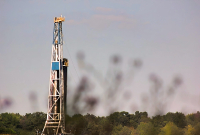Support strong Canadian climate journalism for 2025
With political scientists saying affordability and healthcare are top of mind for both voters and parties in New Brunswick’s upcoming election, the fracking moratorium could be the sole climate issue of this year’s race.
The province is home to Canada’s largest oil refinery owned by Irving Oil, a company that has long been supported by incumbent premier Blaine Higgs, a former Irving Oil executive himself. There is also an ongoing nuclear presence in the province backed by both Higgs’ Progressive Conservatives and the Liberals. Glyphosate is sprayed over Crown land to benefit the forestry industry, which both the Liberals and Greens vowed to stop during the 2020 election.
Environmental groups say those issues, along with fracking, should be brought to the forefront this election while stressing that key issues such as housing, affordability and healthcare are also inherently linked to climate. The election must occur on or before Oct. 21, and the writ is expected to drop Sept. 19.
Mario Levesque, a professor at Mount Allison University, says fracking is likely on voters' minds, following a couple of years of tension both in and out of the legislature about the methane-based fossil fuel.
Incumbent premier Higgs has not unveiled his party’s platform. But he did mention fracking at a campaign event in late August, where he promised to slash two per cent from the province’s sales tax, a move that’s expected to cost the government $450 million a year. At the event, he referred to the province’s fracked gas resources as “the cleanest gas reserves in the world,” and talked about how the province’s fracked gas could help shut down coal plants in China. However, experts have stressed that exporting fossil fuels into Asia will hinder climate goals and increase air pollution. Higgs’ party did not respond to a request for comment.
A fracking moratorium has been in place for a decade, but Higgs has threatened to lift it, with or without First Nations’ consent. According to the provincial government, the moratorium will not be lifted until “a social licence [is] in place” and “a process [is] in place to respect our obligations under the duty to consult with First Nations,” among other requirements. First Nations in the province have been adamant that they will not budge on their anti-fracking position.
In the past couple of years, Green Party Leader David Coon tabled a defeated bill to end fossil fuel development in the province in response to Higgs’ stated intention to lift the fracking ban. During the 2018 election, then-Liberal leader Brian Gallant vowed to maintain the moratorium. So, in that sense, fracking will be on the agenda — but no party has yet made it an explicit issue.
The New Brunswick Anti-Shale Gas Alliance is trying to push the issue onto the agenda by running radio ads and campaigns reminding people of the moratorium and how it protects drinking water in the province. Spokesperson Jim Emberger explains the protests that led to the fracking moratorium “were very real and intense” and show that voters do care about climate, but notes there is “a whole generation of voters who were just little kids when all that happened.”
He hopes the ads, running in the key election areas of Moncton and Saint John, will help people tie fracking to their concerns around health. He notes there is evidence fracking contaminates groundwater and chemicals used in the process cause health problems in nearby communities.
If Higgs stays quiet on fracking and tries to keep it out of the election, that doesn’t mean it's not on his party’s mind, Levesque notes. With Higgs’ PCs, it’s important to note what they don’t talk about. He points to Higgs being silent on rural hospitals in the 2018 election, but then trying, and failing, to close six.
“This election, he's not talking about fracking, and he's kind of had that on the back burner. So if he wins again, I'm kind of thinking he's pushing full-throttle ahead on fracking,” Levesque said.
So far, only the Liberal Party has released its platform, which earmarks affordability and health care as its top concerns, following a promise to open 30 healthcare clinics by 2028. Levesque says the pressing pocketbook issues addressed in the Liberal platform push any climate-related election issues down the priority list for voters.
Poll analyst Éric Grenier calls the election a “toss-up,” but said the Liberals enjoy a slight edge.
Moe Qureshi, director of climate research and policy with the Conservation Council of New Brunswick, stresses that people do care about climate in the province, but agrees with Emberger: the parties need to connect pressing climate issues with health and affordability. Qureshi says many topics voters are concerned about are climate-related: public transportation, extreme weather events, high energy bills and more.
“If you want to address people's concerns with heat waves, you've got to do better on the climate, or if you want to lower energy costs, you've got to do a strategy that can focus more on renewable energy rather than fossil fuels,” he said, while also stressing that fracking is a health-related issue.
“The other concern is the herbicide use. We're getting tons of emails about glyphosate spray on Crown lands, and concerns about clear-cutting.”
Federal-Provincial dynamic
Important context for the election is the growing popularity of Pierre Poilievre’s federal Conservatives combined with voters’ desire for change in government, explained Don Desserud, a P.E.I. political analyst. Higgs is riding Poilievre’s right-wing wave of popularity by pushing topics that have typically been “third rails” for political parties, such as his changes to Policy 713, which the Canadian Civil Liberties Association notes “harms transgender and gender diverse students.”
However, Desserud isn’t convinced voters will associate Higgs with the change they see in Poilievre, noting that people might be willing to vote Conservative federally, but still see Higgs as stagnant and part of the old guard that has led to little tangible change for people living in New Brunswick. He also points to controversy within Higgs’ party, including ministers getting dropped last year after voting against Higgs on Policy 713.
“Not everybody who wants a change does so because they dislike Justin Trudeau, or dislike the Liberal Party, or dislike Liberal Party policies. They just think it's time for a change.... I think the same thing may be happening in New Brunswick,” he said.
“And I think this is where Higgs may be making a mistake. He may be thinking that since people are upset with the federal Liberals and are looking at a person like Poilievre, if he acts like a Poilievre, then…the same support will come over to him.”
Higgs’ strategy of aligning himself with Poilievre ties back to climate, explains University of New Brunswick political science professor, J.P. Lewis. He notes that “culture wars” have infiltrated the province, and being opposed to climate action fits that stance.
Liberal Leader Susan Holt is still introducing herself to voters after being elected in 2022 and is “distancing herself from the federal government and Higgs at the same time,” Lewis explains. He says it’s too early to say if she will choose to focus on climate or skirt it to get that position across.
The province has three elected Green seats under leader David Coon, who Lewis compares to federal leader Elizabeth May for his attention to democratic institutions alongside traditional Green environmental advocacy, and no NDP seats.






Comments